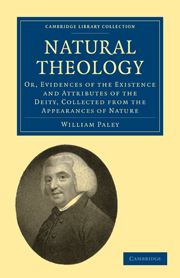 Natural Theology
Natural Theology Published online by Cambridge University Press: 07 September 2010
I Think a defigned and ftudied mechanifm to be, in general, more evident in animals, than in plants: and it is unneceffary to dwell upon a weaker argument, where a ftronger is at hand. There are, however, a few obfervations upon the vegetable kingdom, which lie fo directly in our way, that it would be improper to pafs by them without notice.
The one great intention of nature in the ftructure of plants feems to be the perfecting of the feed; and, what is part of the fame intention, the preferving of it until it be perfected. This intention fhews itfelf, in the firft place, by the care which appears to be taken to protect and ripen, by every advantage which can be given to them of fituation in the plant, thofe parts which moft immediately contribute to fructification, viz. the antheræ, the ftamina, and the ftigmata. Thefe parts are ufually lodged in the centre, the receffes, or the labyrinths of the flower; during their tender and immature ftate, are fhut up in the ftalk, or fheltered in the bud: as foon as they have acquired firmnefs of texture fufficient to bear expofure, and are ready to perform the important office which is affigned to them, they are difclofed to the light and air, by the burfting of the ftem or the expanfion of the petals: after which they have, in many cafes, by the very form of the flower during its blow, the light and warmth reflected upon them from the concave fide of the cup.
To save this book to your Kindle, first ensure no-reply@cambridge.org is added to your Approved Personal Document E-mail List under your Personal Document Settings on the Manage Your Content and Devices page of your Amazon account. Then enter the ‘name’ part of your Kindle email address below. Find out more about saving to your Kindle.
Note you can select to save to either the @free.kindle.com or @kindle.com variations. ‘@free.kindle.com’ emails are free but can only be saved to your device when it is connected to wi-fi. ‘@kindle.com’ emails can be delivered even when you are not connected to wi-fi, but note that service fees apply.
Find out more about the Kindle Personal Document Service.
To save content items to your account, please confirm that you agree to abide by our usage policies. If this is the first time you use this feature, you will be asked to authorise Cambridge Core to connect with your account. Find out more about saving content to Dropbox.
To save content items to your account, please confirm that you agree to abide by our usage policies. If this is the first time you use this feature, you will be asked to authorise Cambridge Core to connect with your account. Find out more about saving content to Google Drive.